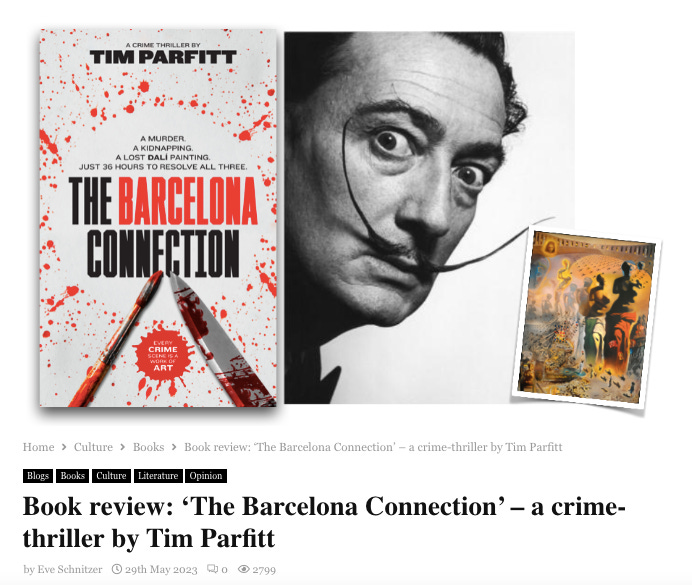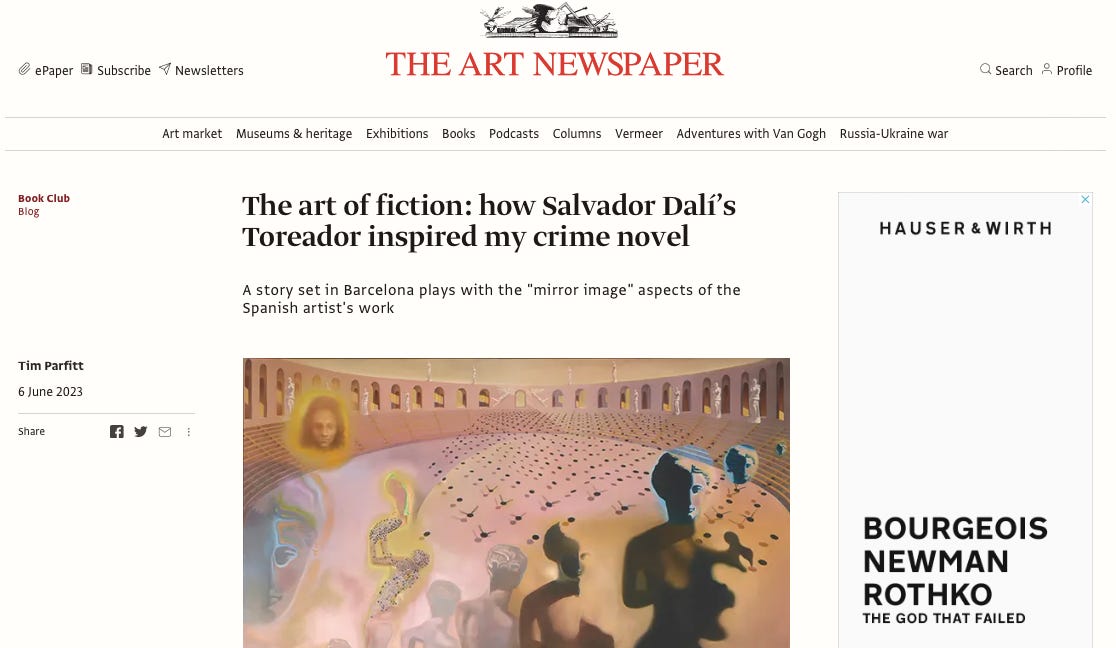Letter from Spain #27
A fragile coalition, split on foreign affairs ... plus TBC notes & research
In Spain, the Israel-Hamas war has shown that Pedro Sánchez’s fragile coalition government (and an ‘acting’ one at the moment) is as split as ever on foreign affairs, and always was.
Sánchez, leader of the PSOE socialists and in office as Spanish prime minister since 2018, has had to govern in a coalition with the left-wing (many say ‘hard left’) Podemos group since 2020, and the two parties have often clashed on foreign policy. Podemos, for example, is against sending any military aid to Ukraine.
Since the terrorist attack by Hamas in Israel on 7 October and the rapid retaliation by Israel in Gaza, Ione Belarra, the current head of Podemos and the acting minister of social rights in Sánchez’s government, accused Israel’s treatment of Gaza as ‘apartheid’ and a ‘planned genocide of the Palestine people’. She also called for Israeli Prime Minister Benjamin Netanyahu to be prosecuted by the International Criminal Court for war crimes.
Whatever your stance on events in the Middle East, Belarra’s comments certainly put Sánchez’s government in the spotlight of the incensed Israeli Ambassador in Spain, Rodica Radian-Gordon, with the Embassy issuing a fierce statement to ‘strongly condemn the recent statements by some members of the Spanish government’, and calling on Sánchez to ‘denounce and condemn unequivocally these shameful statements’.
‘It is deeply worrying that ... certain elements within the Spanish government have chosen to align themselves with this ISIS-type terrorism,’ the Embassy said. ‘These statements are not only absolutely immoral, but they also endanger the safety of Jewish communities in Spain, exposing them to the risk of a greater number of incidents and anti-Semitic attacks.’
Sánchez himself has condemned ‘completely and without any hesitation, the Hamas terrorist attack in Israel’, but at the same time he’s said that ‘Israel has the legitimate right to defend itself within international law and humanitarian law’.
‘The protection of civilians is essential, as is access to international aid for those in need, especially in the Gaza Strip,’ said Sánchez. ‘The only way to definitively resolve the conflict is the recognition of the two States, so that they can co-exist in peace and security.’
Following Belarra’s comments and the Israeli Embassy’s statement, Spain’s Foreign Minister, José Manuel Albares, had to quickly intervene to avoid a diplomatic row - although I’m not sure to what extent he’s managed to avoid it.
Albares called the Embassy’s statement an ‘unfriendly gesture’ and that he ‘categorically rejected the falsehoods expressed … about some of [the Spanish government’s] members’ and ‘did not accept unfounded insinuations about them’. However, he also acknowledged that ‘in every government there are different opinions, much more so in a coalition government’.
After speaking with the Israeli ambassador, he said that ‘the final conclusion is that we are going to work together so the friendship between Spain and Israel, between the people of Spain and Israel, is maintained, as it has been until now’. He also said that only he and Sánchez could speak for Spain’s foreign policies, and that the issue was now ‘settled’.
But is it? The Israeli Embassy’s statement remains on Twitter, and Spain’s acting minister of social rights has stepped up her criticism of Israel, stating that ‘history will not forgive Europe for being complicit in the genocide that Israel is carrying out against the Palestinian people. We must act now, with urgency. Economic sanctions and arms embargo, time is running out.’
It’s a political dilemma for Sánchez and it will further complicate his talks to try and officially form a new government before 27 November. Despite having the general backing of ‘Sumar’, the new alliance led by Yolanda Díaz of left-wing (and ‘hard left’) parties which includes Podemos, it seems to me that the previously sidelined Podemos has become more determined than ever to stand out and show that it is still a force to be reckoned with.
Its former leader Pablo Iglesias - one of the founders of the party and who remains highly influential - warned midweek that Sánchez must also negotiate the main points of his foreign policy with the political groups he depends upon, if he hopes to be officially reinstated.
He has until 27 November to secure a parliamentary majority to govern, otherwise new elections will be triggered for mid-January. With everything still in the air regarding amnesty and the other demands from the Catalan pro-independence parties that I have covered in previous weeks, at the moment I’d put my bet on elections in January …
I spoke about some of this on the radio this week, in my fortnightly chat with Giles Brown on Talk Radio Europe - as well as about the tragic death of the teenager Alvaro Prieto in Sevilla. Here’s the chat from Wednesday 18 October if you’re interested:
The Barcelona Connection - Research
When I first moved to Catalonia in June 2007 to work for a magazine group jointly owned by Grupo Godó and Grupo Planeta, I lived in an aparthotel for six months, in the Pedralbes area of Barcelona, before the whole family came over from the UK and we moved to Sitges.
I mention this because I got to know the zona alta and Pedralbes very well - and it’s where the fictional Jaume, the Marquès de Guíxols, has a home, in addition to his masia in La Bisbal d’Empordà (described in Chapter 2 below).
Chapters 28 and 32 delve further into the character of Jaume, and pinpoint the location of his home in the city:
What could still be termed the Guíxols home in Barcelona, before any imminent visit from the bailiffs, was in the Carrer de Monestir, in the heart of of Pedralbes. Jaume always quipped that it was a white stone’s throw from Pedralbes monastery itself. White, because Pedralbes stemmed from the Latin pedras albas - white stones.
Hurl another white stone and you’d hit the nearby Royal Tennis Club, where Jaume’s father had been a former president in the good old days. Even nearer was the United States Consulate, where helicopters were landing and taking off from its lawns, with dignitaries toing and froing from the US HQ in the Port Olímpic.
We used to entertain clients of our magazines and of La Vanguardia newspaper at the Godó tennis tournament in Pedralbes every April, and I was fortunate enough to be invited along to a few of the verbena parties hosted by the paper’s proprietor over the years, held in his garden next door to the US Consulate. So I know exactly where, and how Jaume once lived, before he was hit by the financial crisis and a subsequent scandal.
I’ve met one or two Marqueses in Spain over the years, too, and the physical description of Jaume is based on a combination of two specific gentlemen I encountered. One of them was somewhat cantankerous, and the other showed me a Dalí painting he owned. So now you know …
Next week, we’ll take a look at Chapter 29 - and the journey from Nîmes to Barcelona.
Previous links to my research notes are here:
Chapter 26 in Letter from Spain #26 (pijos and Beltrán Gómez de Longoria).
Chapter 25 (again) in Letter from Spain #25 (Benjamin’s thoughts on Púbol, Figueres and Port Lligat-Cadaqués).
Chapter 25 in Letter from Spain #23 (Benjamin and Elena on the Passeig Marítim).
Chapter 22 & Chapter 24 in Letter from Spain #22 (Plaça Sant Jaume & Nîmes).
Chapter 21 in Letter from Spain #21 (the Museu Nacional d’Art de Catalunya - MNAC).
Chapter 18 in Letter from Spain #20 (Nîmes).
Chapter 16 in Letter from Spain #19 (Marta Soler visiting the offices of La Vanguardia).
Chapter 15 in Letter from Spain #18 (Sants, Les Corts and the Plaça de la Concòrdia).
Chapter 14 in Letter from Spain #17 (introducing Inspector Vizcaya and Marta Soler).
Chapter 13 in Letter from Spain #16 (the painting - the possible study of The Hallucinogenic Toreador by Salvador Dalí).
Chapters 10 and 12 in Letter from Spain #15 (Isabel Bosch and Lieutenant Trias).
Chapters 8 and 11 in Letter from Spain #14 (Benjamin at Girona Airport and finding the Marqueses’ home in La Bisbal).
Chapter 7 in Letter from Spain#12 (Séverin and Jürgen).
Chapter 5 in Letter from Spain#11 (Elena in Girona).
Chapters 3-4 in Letter from Spain#9 (Marcos Constantinos in Hampstead, plus Benjamin at the UEA & Stansted).
Chapter 2 in Letter from Spain#8 (the home of the Marqueses de Guíxols, not far from La Bisbal d’Empordà).
Chapter 1 in Letter from Spain#7 (Benjamin waking up at the service station).
The Barcelona Connection - Reviews, News & Events
Next Saturday 28 October at 2.30pm, I will be participating in a roundtable discussion hosted by Barcelona City Council for their annual International Community Day, with the topic being ‘How to enjoy and rediscover Barcelona through literature’. The event takes place at the Museu Marítim de Barcelona. It is free to attend the International Community Day, but prior registration is required via this link: https://inscripcions.barcelona.cat/barcelona_international_community_day_2023-en/
Hope to see you there!
Links to reviews & articles
A review of The Barcelona Connection by Michael Eaude has been published in the October edition of Catalonia Today.
‘Short, fast-moving scenes and the deft joining of two completely different plots … the novel is not just breathlessly rapid and action-packed, but overflows with humour and satire.’
‘The excellent plotting, the local knowledge, the surreal humour, the political satire and the speed of events … it’s an admirable and very readable crime novel.’
Here’s the link for a review of The Barcelona Connection by Dominic Begg that came out in La Revista, a publication of the British-Spanish Society.
‘The Barcelona Connection is a fast-moving page-turner with a helter-skelter plot.’
‘The background to this thriller is realistic and familiar to those who know Barcelona well. It’s a world of cynical, ambitious politicians; civil servants promoted via enchufe; friction between Spanish and Catalan investigators; disruptive anti-capitalist activists; bumbling US dignitaries and security guards; the continuing influence of old supporters of Franco; the soulless 21st century, exemplified by apartment hotels seemingly without human staff-members …’
Here’s a link to a review of the book by Eve Schnitzer published by the Spain in English online newspaper.
‘Tim Parfitt very cleverly weaves together two parallel though quite different stories, set against the background of a contemporary Barcelona that is even busier than usual with major international meetings.’
‘Two plot lines interweave, with some highly ironic as well as suspenseful results … this book has a lot to offer the reader, from pure entertainment to solid information and, possibly, a fuller understanding of the complexities of Spain and Catalonia in particular.’
Here’s the link to an article I was asked to write for The Art Newspaper about my research on Salvador Dalí.
You can also click here for the latest reviews on Amazon, as well as on Goodreads and at Barnes & Noble.
The book is available on Amazon or you can also click here to choose where else to order your copy from. It can also be ordered from any bookshop simply by giving the ISBN number: 978-1-7393326-1-7.
For professional enquiries and foreign rights for The Barcelona Connection, please contact my agent Justyna Rzewuska at the Hanska Literary & Film Agency.








